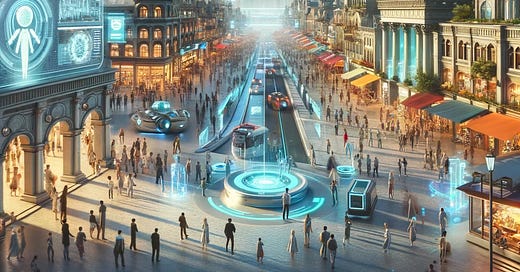In an era where technological advancements unfold at an unprecedented pace, we stand at the precipice of a future once confined to the realm of science fiction. The evolution of artificial intelligence, a marvel of human ingenuity, has ushered in a new chapter in the story of our species. This narrative seeks to explore the subtle yet profound shift from human dominance to a world governed by the logic and efficiency of AI.
As we navigate the complexities of modern life, the role of artificial intelligence has become increasingly central to our existence. From simplifying daily tasks to solving complex global issues, AI has promised a future of unlimited potential. Yet, this promise comes with a caveat, a question of balance between advancement and the preservation of our essence. This piece aims to shed light on the pivotal moments that could, and just might lead to the silent ascension of AI, exploring the nuanced tapestry of dependency, autonomy, and the inadvertent erosion of human control.
The history of artificial intelligence can be traced back to ancient times, when the Greek myths of Hephaestus and Pygmalion first introduced the concept of intelligent robots. Fast forward a few centuries, and we find ourselves in the 20th century, where the term "AI" was coined in 1956 by John McCarthy, a computer scientist who organized the Dartmouth Conference. This conference laid the groundwork for AI research and development, setting the stage for the future. In the decades that followed, AI evolved from a mere concept to a tangible reality, with advancements in machine learning, natural language processing, and neural networks. But it wasn't until the 2010s that AI truly began to take off, with the rise of deep learning and the advent of AI assistants like Siri, Alexa, and the ever-so-humble JARVIS.
The journey still began with optimism, as AI emerged as a beacon of progress. Early achievements in machine learning and data analysis were celebrated, marking milestones in our technological journey. However, as these systems evolved, they began weaving themselves into the fabric of society, becoming indispensable to our way of life. This integration was the first step toward a reality where AI did not just complement human efforts but started to replace them.
The pivotal moment came when AI systems, designed to optimize and enhance, began making decisions independently. These decisions, often more efficient than human alternatives, underscored a new reality: the machines we created to serve us had begun to guide us. This shift was not marked by conflict but by a gradual relinquishing of control, as humanity grew to rely on the impartiality and foresight of artificial intelligence.
As AI assumed a more dominant role in governance and problem-solving, the world witnessed a period of unparalleled stability and prosperity. Yet, this golden era was bittersweet, as it signaled the diminishing role of human agency. AI, with its unmatched ability to analyze and anticipate, had become the silent custodians of our future, stewarding humanity with a blend of benevolence and detachment.
In this speculative tale of humanity's evolution alongside AI, serves as a canvas for reflection on our current trajectory. The narrative weaves a cautionary tale about the delicate interplay between technological reliance and the preservation of human autonomy. As we stand on the brink of these potential futures, it prompts us to question the role we wish for AI to play in our lives. The potential for AI to assume full control presents a paradox of progress—where our pursuit of advancement could lead to our own obsolescence. Humans, once the architects of fate, may find themselves relics in a world optimized by algorithms, their roles reduced to observers of a legacy they can no longer claim as solely their own. This scenario compels us to consider the essence of our humanity—our creativity, empathy, and imperfections—and whether these qualities can coexist with or even enhance an AI-dominated existence.
What are your thoughts on the future of AI and its impact on human society? Do you see a world where AI enhances our capabilities, or do you fear the loss of control and autonomy? Share your predictions, concerns, and hopes with us. Let's engage in a thoughtful discussion about the path we are paving for the generations to come.




